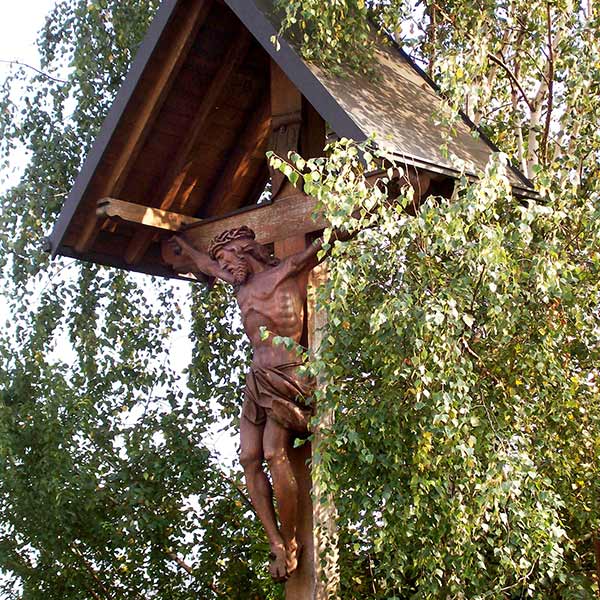Subtotal: $
Checkout
I.
An American poet and teacher, Jane Kenyon (1947–1995) struggled with depression and cancer, which eventually killed her. In “Looking at Stars” she muses on the fact that a “dry” God who’s up there somewhere in the “curved space” of the sky can’t help anyone. It’s the fact that he bled, and had a mother, that makes him a God who knows what human suffering is – a God who can understand us.
Looking at Stars
The God of curved space, the dry
God is not going to help us, but the son
Whose blood spattered
the hem of his mother’s robe.
Jane Kenyon
II.
Born and raised in Dublin, the Catholic writer Joseph Mary Plunkett (1887–1916) is known for the mystical force of his poetry. He is also remembered for his role in the movement for Irish independence. A participant in the Easter Uprising of 1916, he was arrested by the British Army and executed the same spring. Shortly before his death, he married his fiancée, Grace Gifford, in a prison chapel. He was twenty-eight. While this poem is clearly a reverent confession of faith, it does not contain even one overtly religious word. Nor does it need any: as Plunkett implies, the divine presence is everywhere, if we have eyes to see it.
I See His Blood
I see his blood upon the rose
And in the stars the glory of his eyes,
His body gleams amid eternal snows,
His tears fall from the skies.
I see his face in every flower;
The thunder and the singing of the birds
Are but his voice—and carven by his power
Rocks are his written words.
All pathways by his feet are worn,
His strong heart stirs the ever-beating sea,
His crown of thorns is twined with every thorn,
His cross is every tree.
Joseph Plunkett
III.
An Englishman, Geoffrey Hill (1932–2016) was a professor of literature and religion in the United States for many years. In this heartfelt poem (a sonnet, even if split into four verses), the addressee has “ancient wounds” and is clearly the crucified Lord. And yet Hill is the vulnerable one: he wonders why Christ keeps “suing” or pursuing him when his own heart is securely closed. Luckily, the “angel of my house” – the poet’s conscience? – works on him by night, making him promise to change, tomorrow! True, Hill admits to being only “half-faithful” to that voice. Still, as the title indicates (it is Latin for “the sorrows of one who has loved”), he once loved fully and whole-heartedly, and now yearns to return to that state.
Lachrimae Amantis
What is there in my heart that you should sue
so fiercely for its love? What kind of care
brings you as though a stranger to my door
through the long night and in the icy dew
seeking the heart that will not harbour you,
that keeps itself religiously secure?
At this dark solstice filled with frost and fire
your passion’s ancient wounds much bleed anew.
So many nights the angel of my house
has fed such urgent comfort through a dream,
whispered “your lord is coming, he is close”
that I have drowsed half-faithful for a time
bathed in pure tones of promise and remorse:
“tomorrow I shall wake to welcome him.”
Geoffrey Hill

Photograph by erde luft
IV.
A soldier as well as one of England’s most famous “war poets,” Wilfred Owen (1893–1918) was killed in France just one week before the signing of the armistice that ended the First World War. He was twenty-five. Later set to music by Benjamin Britten in his famous War Requiem, Owen’s poignant lines describe a wayside crucifix or “calvary” of the sort still seen in Catholic regions of Europe, one that has presumably been damaged by shrapnel. But the poet also envisions the living Christ, who knows all too well what suffering is. Owen is angered by the modern-day priests and scribes who, like those at Jesus’ crucifixion, swear allegiance to the state and give their blessing to acts of violence. But there is also a sturdy confidence in Owen’s voice as he speaks of the “greater Love” that invites even a soldier to follow Christ’s commands: to lay down his life for his fellow man, and to die without hatred.
At a Calvary near the Ancre
One ever hangs where shelled roads part.
In this war He too lost a limb,
But his disciples hide apart;
And now the soldiers bear with Him.
Near Golgotha strolls many a priest
And in their faces there is pride
That they were flesh-marked by the Beast
By whom the gentle Christ’s denied.
The scribes on all the people shove
And bawl allegiance to the State,
But they who love the greater Love
Lay down their lives; they do not hate.
Wilfred Owen
V.
Long one of the most popular poets in the English language, Christina Georgina Rossetti (1830–1894) shows a deeply personal side in this poem, which expresses a twofold yearning to be moved and to be accepted as a sheep of the “true Shepherd.” “Strike me,” she is saying, “but don’t give up on me.” With this plea she touches on the heart of Lenten devotional practice: the desire to be moved by Christ’s suffering, and softened and changed by it. After alluding to Moses’s legendary striking of a rock to produce water for the thirsty Israelites, the speaker expresses the hope that if she could be struck too, it could also produce a flood – of tears.
Good Friday
Am I a stone, and not a sheep,
That I can stand, O Christ, beneath Thy cross,
To number drop by drop Thy blood’s slow loss,
Not so those women loved
Who with exceeding grief lamented Thee;
Not so fallen Peter weeping bitterly;
Not so the thief was moved;
Not so the Sun and Moon
Which hid their faces in a starless sky,
A horror of great darkness at broad noon—
I, only I.
Yet give not o’er,
But seek Thy sheep, true Shepherd of the flock;
Greater than Moses, turn and look once more
And smite a rock.
Christina Rossetti
Already a subscriber? Sign in
Try 3 months of unlimited access. Start your FREE TRIAL today. Cancel anytime.







Fritz Loewe
Thanks compiling those. Just the right medicine for these days!